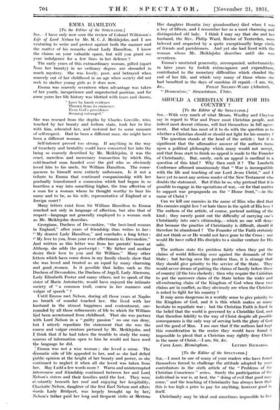SHOULD A CHRISTIAN FIGHT FOR HIS COUNTRY ?
[To the Editor of the SPECTATOR.] ' SIR,—With very much of what Messrs. Woolley and Clayton say in regard to War and Peace most Christian people, and indeed most decent citizens, will find themselves in full agree- ment. But what has most of it to do with- the question as to whether a Christian should or should not fight for his country ?
The question stands at the head of the article ; but it is significant that the affirmative answer of the authors turns upon a political philosophy which many would not accept, and that from start to finish no appeal is made to the Founder of Christianity. But, surely, such an appeal is cardinal in a question of this kind ? Why then omit it ? The Lambeth Conference affirmed unanimously that " War is incompatible with the life and teaching of our Lord Jesus Christ," and I have yet to meet any serious reader of the New Testament who doubts the statement. But if this be so, why pretend that it is possible to engage in the operations of war,—or for that matter to support war propaganda on the " Home front,"—in the name of Christ ? -
Can we kill our enemies in the name of Him who died that His enemies might live ? or hate them in the spirit of His love ? The authors of the artiele, of course, pretend. nothing of the kind ; they merely point out the difficulty of carrying one's Christianity into one's citizenship,—which no one will deny- But because the practice 'of Christianity is difficillt,. should it therefore be abandoned ? The Founder of the Faith certainly did not think so or He would not hive 'gone to the Cross ; nor would He have called His disciples to a similar venture for HiS sake.
The authors state. tie problem fairly when they put the claiins of world fellowship over against the demands of the State ; but having seen the problem thus, it is sti-ange: that they should give priority to 'the service of the State. They would never dream of putting the claims of-family before those of country(if the two clashed) ; then why require the Ciirfstian to put the narrower claim -of the State before the wider and all.embracing claim of the Kingdom of God when these two &thus are-in-conflict, as'theY 'obviously are when the Christian is asked to fight for his country It may seem dangerous in a worldly sense to give priority to the KingdoM of God, and it is this which makes sci• many hesitate to repudiate war ; but the Christian Faith is fixed in the belief that the world is governed by a .Christlike: God, and that therefore fidelity' to the Way of Christ despite all possible consequences is the only way of serving both the gloiy of GOd and the:good of Man. .I am -sure that if the authors had kept this consideration in the centre they would have found it impossible to pleadthat a Christian may rightly deny Christ in the name of Christ.2–I am, Sir, -&c.
































































 Previous page
Previous page